通用版小学英语小升初专题复习语法综合 形容词课件
文档属性
| 名称 | 通用版小学英语小升初专题复习语法综合 形容词课件 |  | |
| 格式 | pptx | ||
| 文件大小 | 498.7KB | ||
| 资源类型 | 试卷 | ||
| 版本资源 | 通用版 | ||
| 科目 | 英语 | ||
| 更新时间 | 2023-03-01 11:31:49 | ||
图片预览

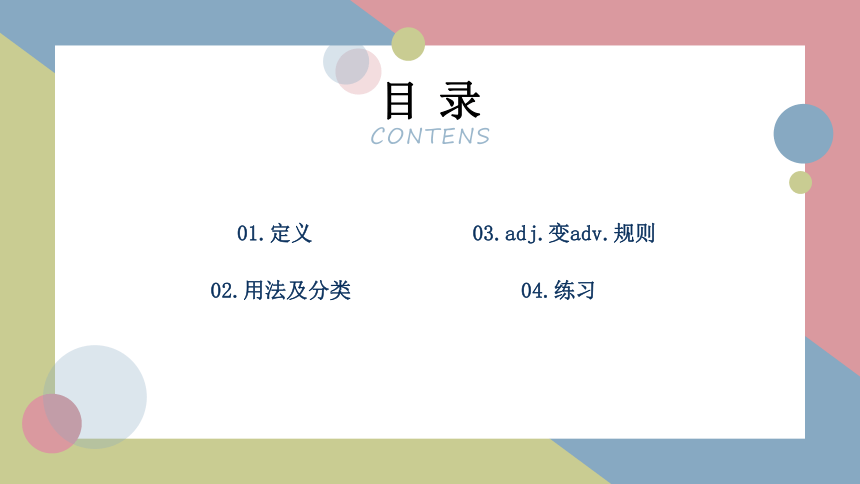

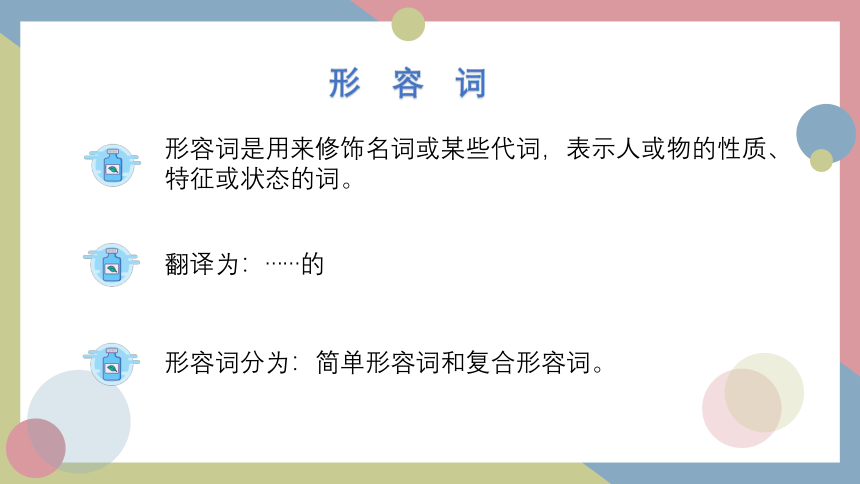
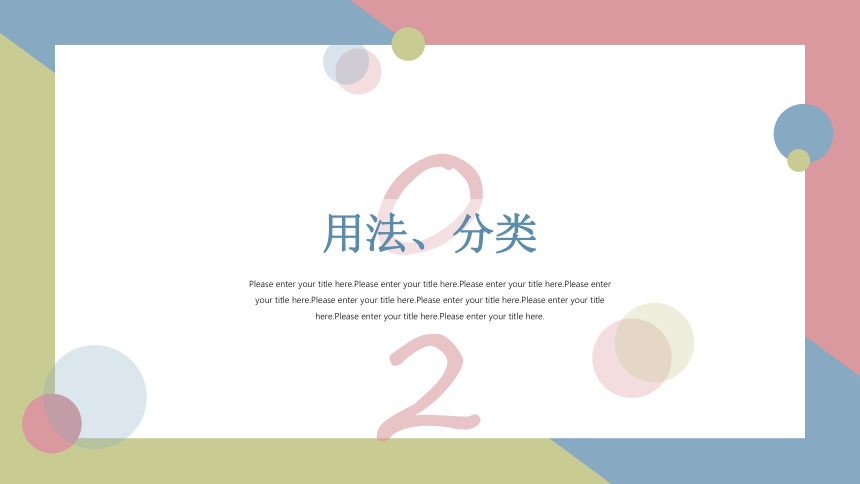
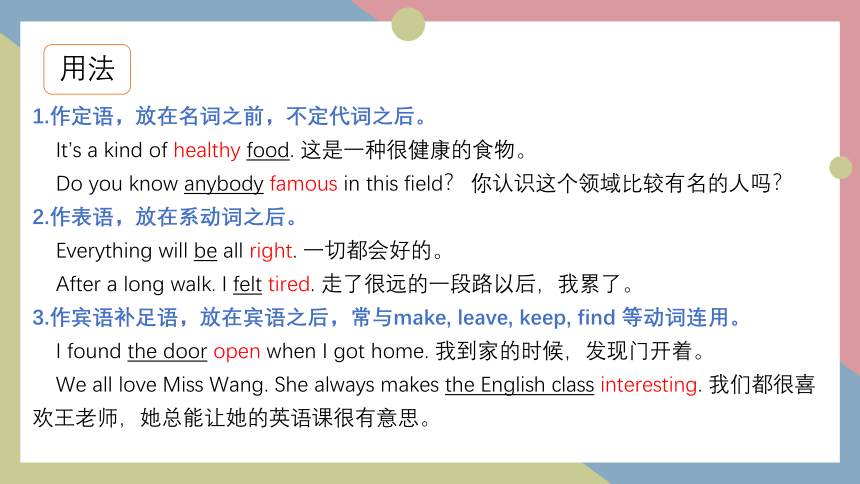
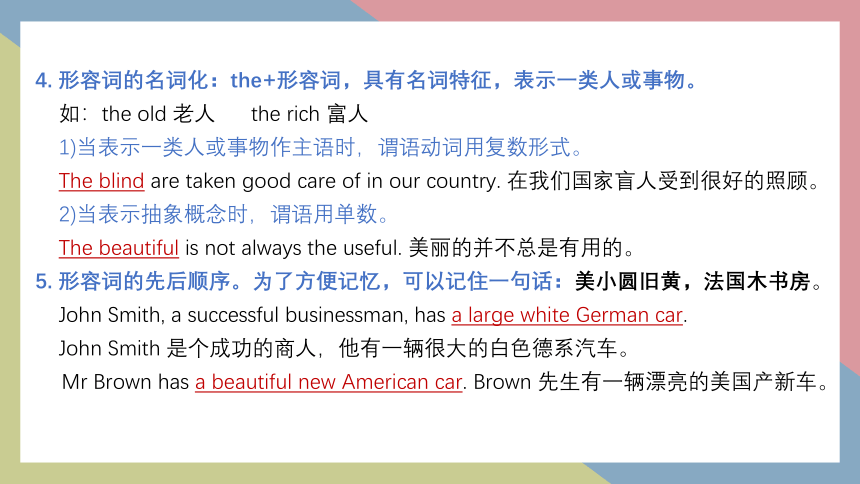
文档简介
(共15张PPT)
形容词
Mona
adj.
目 录
CONTENS
01.定义
02.用法及分类
03.adj.变adv.规则
04.练习
01
定义
形容词是用来修饰名词或某些代词,表示人或物的性质、特征或状态的词。
翻译为:……的
形容词分为:简单形容词和复合形容词。
形容词
02
用法、分类
Please enter your title here.Please enter your title here.Please enter your title here.Please enter your title here.Please enter your title here.Please enter your title here.Please enter your title here.Please enter your title here.Please enter your title here.
用法
1.作定语,放在名词之前,不定代词之后。
It’s a kind of healthy food. 这是一种很健康的食物。
Do you know anybody famous in this field? 你认识这个领域比较有名的人吗?
2.作表语,放在系动词之后。
Everything will be all right. 一切都会好的。
After a long walk. I felt tired. 走了很远的一段路以后,我累了。
3.作宾语补足语,放在宾语之后,常与make, leave, keep, find 等动词连用。
I found the door open when I got home. 我到家的时候,发现门开着。
We all love Miss Wang. She always makes the English class interesting. 我们都很喜欢王老师,她总能让她的英语课很有意思。
4. 形容词的名词化:the+形容词,具有名词特征,表示一类人或事物。
如:the old 老人 the rich 富人
1)当表示一类人或事物作主语时,谓语动词用复数形式。
The blind are taken good care of in our country. 在我们国家盲人受到很好的照顾。
2)当表示抽象概念时,谓语用单数。
The beautiful is not always the useful. 美丽的并不总是有用的。
5. 形容词的先后顺序。为了方便记忆,可以记住一句话:美小圆旧黄,法国木书房。
John Smith, a successful businessman, has a large white German car.
John Smith 是个成功的商人,他有一辆很大的白色德系汽车。
Mr Brown has a beautiful new American car. Brown 先生有一辆漂亮的美国产新车。
常见名词变形容词的方法
表示天气的名词,一般在词尾加y。如:cloud→cloudy 多云的
表示方位的名词,一般在词尾加ern。如:west→western 西方的
表示称谓的名词,一般在词尾加ly。如:friend→friendly 友好的
表示时间的名词,一般在词尾加ly。如:day→daily 日常的
表示物质的名词,一般在词尾加en/y。如:wood→wooden 木制的
stone→stony 石制的
表示情感的名词,一般在词尾加ful。如:care→careful 认真的
表示抽象意义的名词,部分在词尾加y。如:luck→lucky 幸运的;
否定的形容词后缀less。如:hope→hopeless 绝望的
表示各大洲与国家的名词,一般在词尾加n。如:America→American美国的
03
adj.→adv.规则
Please enter your title here.Please enter your title here.Please enter your title here.Please enter your title here.Please enter your title here.Please enter your title here.Please enter your title here.Please enter your title here.Please enter your title here.
情况 组成 例词
一般情况下 +ly quick-quickly、careful-carefully
以y结尾的单音节词 +ly dr-dryly、shy-shyly
以辅音字母+y结尾的 变y为i,再+ly lucky-luckily、
easy-easily
以元音+e结尾的词 去e+ly true-truly、due-duly
以le结尾 去e+ly terrible-terribly、simple-simply
以e结尾的开音节词 +ly nice-nicely、wise-wisely
ll结尾的词 +y full-fully、dull-dully
ic结尾的词(除public-publicly) +ally bassic-bassically、automatic-automatically
不规则变化
1.自己既是形容词也是副词,无需变化。
eg:fast-fast early-early high-high hard-hard late-late
far-far wide-wide alone-alone
2. 固然以ly结尾,但是是形容词,不可以直接用来修饰动词:
eg:friendly, lively, lovely, lonely likely.motherly,manly 等。
3. 有些形容词自己即为副词,同时也有加-ly 的副词形式。但加不加ly 意思不同样,使用时需注意,如:
eg:late(形容词,晚的)---late(副词,晚地),lately(近来)
high(形容词,高的)--high(副词,高地),highly(副词,高度地,恨特别)
04
练习题
Please enter your title here.Please enter your title here.Please enter your title here.Please enter your title here.Please enter your title here.Please enter your title here.Please enter your title here.Please enter your title here.Please enter your title here.
当堂过关
( )1.The flower is______.
A.beautiful B.friendly C.kind
( )2.The food on the table smells_____.You can’t eat it.
A,yummy B.badly C.well D.bad
( )3.I have______to buy that book.
A.money enough B.enough money
C.moneys enough D.enough moneys
A
B
B
形容词
Mona
adj.
目 录
CONTENS
01.定义
02.用法及分类
03.adj.变adv.规则
04.练习
01
定义
形容词是用来修饰名词或某些代词,表示人或物的性质、特征或状态的词。
翻译为:……的
形容词分为:简单形容词和复合形容词。
形容词
02
用法、分类
Please enter your title here.Please enter your title here.Please enter your title here.Please enter your title here.Please enter your title here.Please enter your title here.Please enter your title here.Please enter your title here.Please enter your title here.
用法
1.作定语,放在名词之前,不定代词之后。
It’s a kind of healthy food. 这是一种很健康的食物。
Do you know anybody famous in this field? 你认识这个领域比较有名的人吗?
2.作表语,放在系动词之后。
Everything will be all right. 一切都会好的。
After a long walk. I felt tired. 走了很远的一段路以后,我累了。
3.作宾语补足语,放在宾语之后,常与make, leave, keep, find 等动词连用。
I found the door open when I got home. 我到家的时候,发现门开着。
We all love Miss Wang. She always makes the English class interesting. 我们都很喜欢王老师,她总能让她的英语课很有意思。
4. 形容词的名词化:the+形容词,具有名词特征,表示一类人或事物。
如:the old 老人 the rich 富人
1)当表示一类人或事物作主语时,谓语动词用复数形式。
The blind are taken good care of in our country. 在我们国家盲人受到很好的照顾。
2)当表示抽象概念时,谓语用单数。
The beautiful is not always the useful. 美丽的并不总是有用的。
5. 形容词的先后顺序。为了方便记忆,可以记住一句话:美小圆旧黄,法国木书房。
John Smith, a successful businessman, has a large white German car.
John Smith 是个成功的商人,他有一辆很大的白色德系汽车。
Mr Brown has a beautiful new American car. Brown 先生有一辆漂亮的美国产新车。
常见名词变形容词的方法
表示天气的名词,一般在词尾加y。如:cloud→cloudy 多云的
表示方位的名词,一般在词尾加ern。如:west→western 西方的
表示称谓的名词,一般在词尾加ly。如:friend→friendly 友好的
表示时间的名词,一般在词尾加ly。如:day→daily 日常的
表示物质的名词,一般在词尾加en/y。如:wood→wooden 木制的
stone→stony 石制的
表示情感的名词,一般在词尾加ful。如:care→careful 认真的
表示抽象意义的名词,部分在词尾加y。如:luck→lucky 幸运的;
否定的形容词后缀less。如:hope→hopeless 绝望的
表示各大洲与国家的名词,一般在词尾加n。如:America→American美国的
03
adj.→adv.规则
Please enter your title here.Please enter your title here.Please enter your title here.Please enter your title here.Please enter your title here.Please enter your title here.Please enter your title here.Please enter your title here.Please enter your title here.
情况 组成 例词
一般情况下 +ly quick-quickly、careful-carefully
以y结尾的单音节词 +ly dr-dryly、shy-shyly
以辅音字母+y结尾的 变y为i,再+ly lucky-luckily、
easy-easily
以元音+e结尾的词 去e+ly true-truly、due-duly
以le结尾 去e+ly terrible-terribly、simple-simply
以e结尾的开音节词 +ly nice-nicely、wise-wisely
ll结尾的词 +y full-fully、dull-dully
ic结尾的词(除public-publicly) +ally bassic-bassically、automatic-automatically
不规则变化
1.自己既是形容词也是副词,无需变化。
eg:fast-fast early-early high-high hard-hard late-late
far-far wide-wide alone-alone
2. 固然以ly结尾,但是是形容词,不可以直接用来修饰动词:
eg:friendly, lively, lovely, lonely likely.motherly,manly 等。
3. 有些形容词自己即为副词,同时也有加-ly 的副词形式。但加不加ly 意思不同样,使用时需注意,如:
eg:late(形容词,晚的)---late(副词,晚地),lately(近来)
high(形容词,高的)--high(副词,高地),highly(副词,高度地,恨特别)
04
练习题
Please enter your title here.Please enter your title here.Please enter your title here.Please enter your title here.Please enter your title here.Please enter your title here.Please enter your title here.Please enter your title here.Please enter your title here.
当堂过关
( )1.The flower is______.
A.beautiful B.friendly C.kind
( )2.The food on the table smells_____.You can’t eat it.
A,yummy B.badly C.well D.bad
( )3.I have______to buy that book.
A.money enough B.enough money
C.moneys enough D.enough moneys
A
B
B
